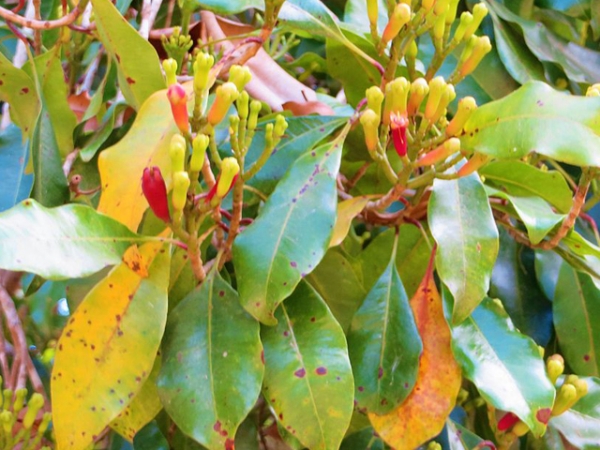Clove Bud Essential Oil
Eugenia carophyllata
Three types of clove essential oils are derived from the clove tree evergreen: clove bud oil, clove leaf oil, and clove stem oil. Out of the three, clove bud essential oil is the most popular in aromatherapy.
Known Uses
Clove Bud Essential Oil is known for its oral health benefits. It has been approved as a dental anesthetic and as a mouthwash and gargle. It can help relieve toothaches, as well as help fight mouth and throat infections. It is very effective against dental pain, sore gums, mouth ulcers, cavities, and bad breath and is often added to pharmaceutical and dental products.
Clove Bud Essential Oil helps relax the smooth muscle lining in your gastrointestinal tract. It can aid in halting digestive problems, like nausea and vomiting. And, it can help with problems like hiccups, indigestion, motion sickness, and excess gas.
Clove Bud Oil can be used to help relieve respiratory problems, such as cough, colds, sinusitis, asthma, and tuberculosis. When applied topically it can be used to treat fungal infections, wounds, and cuts, as well as skin problems like athlete’s foot, warts, acne, sagging skin, and wrinkles.
Cove Bud Essential Oil has the ability to stimulate your metabolism, improve your blood circulation and lower body temperature. It can also help relieve stress and lessen mental exhaustion, insomnia, depression and anxiety. Clove Bud Oil can also work as an aphrodisiac.
In addition to its varied health benefits and its use as a flavoring in foods, Clove Bud Essential can be added together with citrus essential oils to form an insect repellant. It is also used as a fragrance in perfumes and in soaps for its relaxing and antiseptic properties.
History
The clove tree is native to Southeast Asian countries like the Maluku Islands in Indonesia. During the time of the ancient Greeks and Romans, Clove Oil was used to relieve toothaches and to combat bad breath. Its presence was also found in Chinese medicine with the same purpose. Archeologists have found cloves in a ceramic vessel in Syria dating back to 1721 BC. In 1522, Magellan's ship returned from its fateful trip around the world with a ship loaded with cloves and nutmeg, much to the delight of Spain because it was believed that cloves were worth more than their weight in gold. By the 18th century cloves were being grown in many places including Zanzibar, Madagascar, Brazil, Mauritius, Ternate, Tidore, and Tanzania, causing the price of cloves to become more affordable.
Warnings
The topical application of undiluted Clove Bud Essential Oil can lead to serious skin problems. Dilute Clove Bud Oil with a carrier oil like jojoba, coconut, or olive oil to check for allergic reactions. Or, perform a skin test by applying a drop on your skin and observe for any side effects.
Clove Bud Oil is considered a dangerous sensitizer in some individuals. High concentrations of eugenol in the oil may irritate mucous membranes and cause dermatitis or other skin problems. It should never be used on damaged skin. In some cases, the oil may lead to photosensitivity. For instance, exposure to sunlight after the application of undiluted Clove Bud Oil can lead to severe burns or the spread of viral sores.
Anyone using anticoagulants or aspirin should not use any of the Clove Oils. Clove Bud Oil can also cause blood glucose levels to plummet. Diabetics should check their glucose levels often when using it. Individuals with liver or kidney disease should not use Clove Bud Oil because it can cause damage to both organs.
Pregnant, nursing women and children should not use Clove Bud Oil due to possible intestinal discomfort.
SHOP FOR CLOVE BUD ESSENTIAL OIL ON AMAZON
